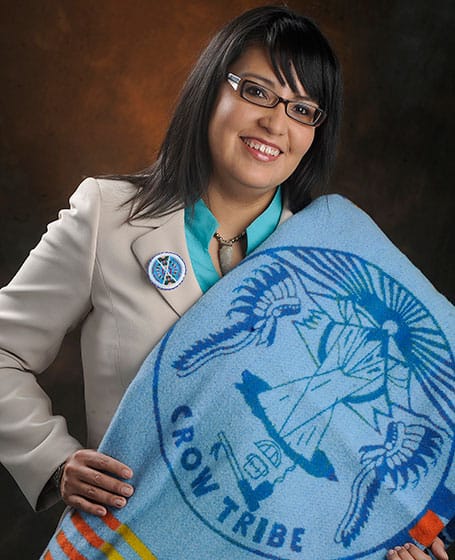Melissa Holds the Enemy
Justice on the Reservation
As a child in the Crow Nation in southern Montana, Melissa Holds the Enemy JD2010 wrestled with her ambitions. “The notion of attending a world-class university like [UW–Madison] seemed to be an unattainable dream,” she says. “I believed that only individuals with wealthy parents and college funds had access to a great education.” But she saw that her community had a deep need for trained and talented attorneys, and so she resolved to seek an education at the UW Law School, where she could explore what traditions such as the Wisconsin Idea and Law in Action meant.

Photo courtesy of David Grubbs.
In Madison, Holds the Enemy learned not only the law but also how to use it to advocate on behalf of the Crow Nation. After graduation, the 2012 recipient of WAA’s Forward under 40 Award became the deputy executive counsel for one of the largest Indian reservations in the United States. During her tenure, she’s kept the tribal citizens of the Crow Nation informed about the developments in Cobell v. Salazar, a $3.4 billion settlement of a class-action lawsuit brought by American Indians against the federal government over mismanagement of Indian assets. She’s also kept communities informed about the issues surrounding the Crow Water Rights Settlement Act, which confirmed and quantified the tribe’s water rights on a significant stretch of the Bighorn River. She recently provided oversight to the conclusion of the 30-year-long settlement.
Her success led to a promotion, and she now serves as lead counsel for the executive branch of the Crow Nation. But it was at the UW, Holds the Enemy says, “where my dreams became reality.” Her two children both consider themselves proud Badgers and hope to return to Madison for their education, and even her parents put the word BADGERS on their Montana license plate.
“Native Americans remain at the bottom of nearly every social indicator,” she says. “The legacies of historical trauma endure, and, perhaps most disturbingly, hopes and expectations remain dismally low. My experience at the University of Wisconsin sowed the seeds of a fruitful career that will be spent addressing those concerns.”
 87° F
87° F